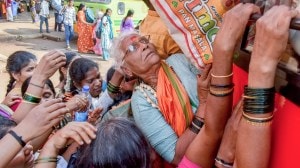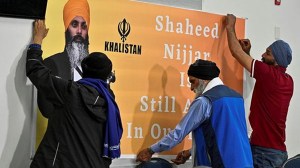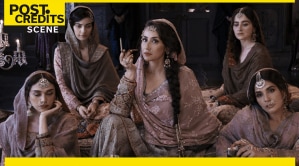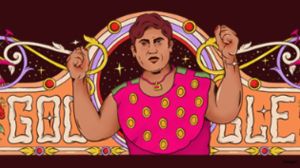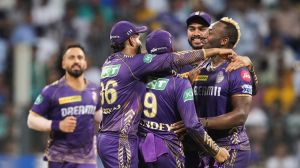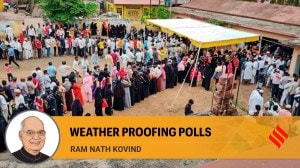- India
- International
Many new cracks on Maharashtra’s political ground but above it, one question: Modi versus?
An Express Series -- Mumbai to Murshidabad: The Indian Express retraces the route from where Rahul Gandhi’s second ‘yatra’ ended, takes detours to listen to people -- on where the Opposition and ruling party are headed
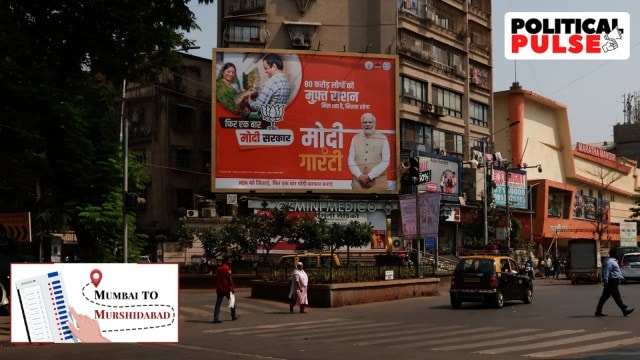 A ‘Modi guarantee’ hoarding in Mumbai. (Express Photo by Amit Chakravarty)
A ‘Modi guarantee’ hoarding in Mumbai. (Express Photo by Amit Chakravarty)When the Bharat Jodo Nyay Yatra wound to an end in a rally at Mumbai’s Shivaji Park on March 17, those who were watching it closely noted two departures from the past. Rahul Gandhi walked up to the flaming torch set in the patch of green to pay his respects at the Bal Thackeray memorial in the Park’s premises. And when Uddhav Thackeray opened his speech, a word was conspicuously missing, it had been substituted. Instead of saying “My Hindu brothers, sisters, mothers…”, as he usually did, Uddhav said: “My patriotic brothers, sisters, mothers…”.
Congress and Sena, traditional rivals that have stared each other down across the state’s “secular vs communal” divide for nearly six decades, were acknowledging, ahead of this election, their changed compulsions in a reconstituted political context.
This dramatic reset since the last Lok Sabha election in 2019 ripples and echoes in Maharashtra’s political field — the cloak-and-dagger pulling down and putting together of governments and the split of two regional parties under the shadow of Central agencies ED-CBI and I-T, ending in two new alliances, of three parties each, on either side of the divide: The BJP plus Shinde Sena plus Ajit Pawar-led NCP versus Congress plus Shiv Sena-led by Uddhav Thackeray plus Sharad Pawar’s NCP.
The Indian Express travelled across a dozen constituencies in the Konkan and north Maharashtra belt, headed to polls later next month. All these were swept by the BJP-undivided Sena alliance in 2019, which posted a whopping 51.34 per cent vote share overall with 41 of Maharashtra’s 48 seats. How this arithmetic works out on June 4 will shape the national verdict.
But today, “Modi versus?” seems starkly inscribed into spatial reality.

There are only large hoardings, in this stretch, of Modi’s “guarantees”, ranging from free rations to a bigger space mission, and almost no posters or publicity of other politicians and parties. You find snapshots of bitterness and dispiritedness among non-BJP leaders and rancour among those who feel they were left with no alternative to switching parties.
Among the people, the sizeable support still enjoyed by Narendra Modi has a new despite-it-all edge to it. In a state that has witnessed the BJP use its strong arm against political opponents and get away with it, there is more of a strain now on the aspirational voter’s willing suspension of disbelief.
Even as they give reasons of “vikas (development)”, “Hindutva (mandir)” and “India’s growing respect in the world”, there is a greater reliance on arguments that say “positives outweigh negatives” and “ends matter more than the means”. The hope for change that Modi represented for many in 2014 and 2019 is now threaded with “power politics is like that only” cynicism, and an almost helplessness, “but where is the alternative”.
On both sides of the political divide, you hear discontents, mostly on rising prices and especially among farmers — onion farmers in this belt are articulate on the grievous toll taken by an erratic and consumer-centric policy. But, unlike in previous elections, the BJP’s dominance, and especially its all-conquering slogan of “400 paar” also provokes, among its critics, disquieting expressions of distrust in the poll machinery.
In Dalit clusters in a state of high awareness and literacy, it has also sparked a new worry — of a threat to the edifice of the “sanvidhan (Constitution)”, offering special protections to the marginalised, that Babasaheb Ambedkar painstakingly built.
In Malharkhan Dalit basti in Nashik city, where most of the makeshift houses fly blue flags of Prakash Ambedkar’s party Vanchit Bahujan Aghadi, which is expected to cut into the SC vote for the Opposition alliance, Damodar Anna Pagare, a farmer, says: “The Modi guarantee is all a mirage, look at the price of the gas cylinder, how it has shot through the roof, and even the free foodgrain rations are of poor quality.”
Then he comes to the main point: “This election, we will vote for jo sanvidhan ki raksha karega, those who protect the Constitution”. If the Constitution is changed, he fears that “Dalits will be implicated in cases and won’t get bail, reservation kam ho jayega (will be reduced)”.
In the SC basti of Padga village off the Thane-Nashik highway, Reshma Dunde, a housewife, also talks about both rising school fees and prices and the sanvidhan: “What will happen to us if the Constitution is changed?”. But Ashwini Ashok Kashiwale, a BJP member, dismisses the concerns expressed by others of her community: “This is a rumour (of changing the Constitution). My people can get their work done by joining with a powerful BJP. There is a new Buddh Vihar in my village, the road is better, and the zilla parishad school…”
Outside KTHM College in Nashik, in a group of students, most of them first-time voters, Siya Chandrashekhar Zare talks about the Modi government’s yojanayein (schemes), which she says are benefiting everyone, and its foreign policy, even though she is uncomfortable, she says, about the tod-fod (splitting) of parties in Maharashtra. “Modi was walking ahead of the others, at the G-20…”
Others in the group talk of issues and problems — “We need a change in the education system, which is deeply unequal and teaching is of low quality”, says Harshada Barku. But the demands for change are mostly addressed to the incumbent, not to the Opposition. Because: “Modi has a clear vision, we don’t know about the others. The Opposition alliance has many contradicting agendas, and if it gets power, it will spend time in only managing them”, says Aakash Bairagi.
“We don’t know about Rahul Gandhi”, many say — because he does not market himself well, or he is not “strong”, and because he has no experience of governing. Others say he cannot be taken seriously because he comes from a powerful family. Rahul Gandhi’s two yatras have helped make his presence felt — and may have energised Congress workers — but there is little evidence that they have made a significant dent in voter scepticism about his ability to be an alternative to Modi.
For Sumit Phopse, on balance, it is advantage Modi, because “We don’t look at (misuse of) ED-CBI”. After all, “BJP is targeting its political opponents, not troubling the people (janata ko tang nahi kar rahi)”.
In Pimpalgaon, dotted with storage sheds, and known in these parts as one of the biggest markets in Asia for onions, a group of farmers and traders discusses the election at a fruit stall — support for Modi here almost borders on criticism of him. There is talk of how he is the only choice because he is the only man standing.
The sankat or danger for farmers is not just “aasmani (from the elements)”, but also “sultani (from the government)”, they say. Farmers here have been victims of not just delayed and unseasonal rain, but also of rising input costs and falling crop prices exacerbated by arbitrary export bans and duties. And yet, says Pramod Gaekwad, “Aayegi toh BJP hi (it will be BJP). Paryay nahi hai, unko baitha diya (there is no one on the other side, they have been made to stand down).” All the strong leaders on the Opposition’s side have crossed over to the BJP, they say. “We used to hear it being said ‘naam-o-nishan chheen loonga’, I will obliterate you, now we know what that means”, says Imran Kotwal.
Balasaheb Wagh sums it up: “Modi theek hai, magar bhav chahiye (Modi is alright but farmers need better prices). Doosra aadmi chalega, par doosra aadmi hai hi nahin (an alternative would be good, but there is no alternative)”.
A little distance away, in Sogras village, the agitation of a group of Maratha farmers on prices but more on what they see as the BJP government’s bid to delay Maratha reservation, is more unmixed. “Hindutva khatre mein nahin hai, log khatre mein hain (livelihoods, not Hindutva, are endangered)”, says Vikas Ghule.
And in Malegaon, the formidable challenge of a demoralised and splintered Opposition against a powerful BJP may be making sections of the minority look again at Uddhav Thackeray, whose party once spewed hate against Muslims, but is now recasting itself, if strategically, in alliance with the Congress and Sharad Pawar’s NCP. “Now there are cameras everywhere”, says Sheikh Ashfaq, welder. “(If there are riots), you can catch the culprit”. “Uddhav helped everyone as CM during the corona lockdown… yeh daur alag hai (these are different times)”, says Shafiq Ahmed, cushion maker.
At the Eidgah ground in the city, dotted with bright lights and alive with children on swings and rides on a sultry evening, Zuleikha Nisar Ahmed, who works on a power loom for daily wages, also speaks of the changing times.
“We come here only once a year, because every outing has become so expensive…Jaane aane ki sau-sau lag jaate hain, aur oopar se bachon ka khana-khelna… hazaar toh aise hi (it costs Rs 100 each way and then money for children’s food and play… we end up spending upto Rs 1000 for the family’s trip to the Eidgah)”.
Buzzing Now
May 04: Latest News
- 01
- 02
- 03
- 04
- 05






